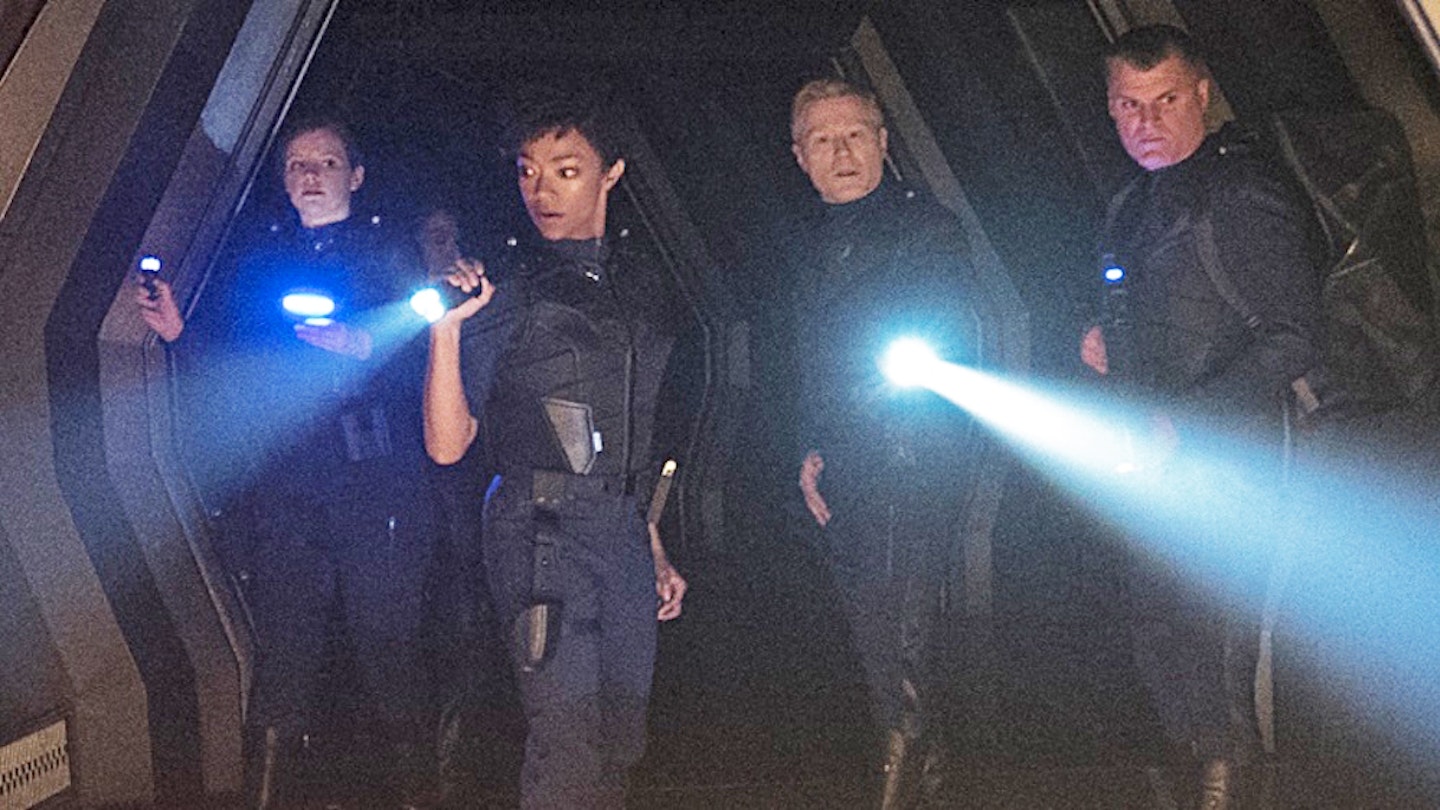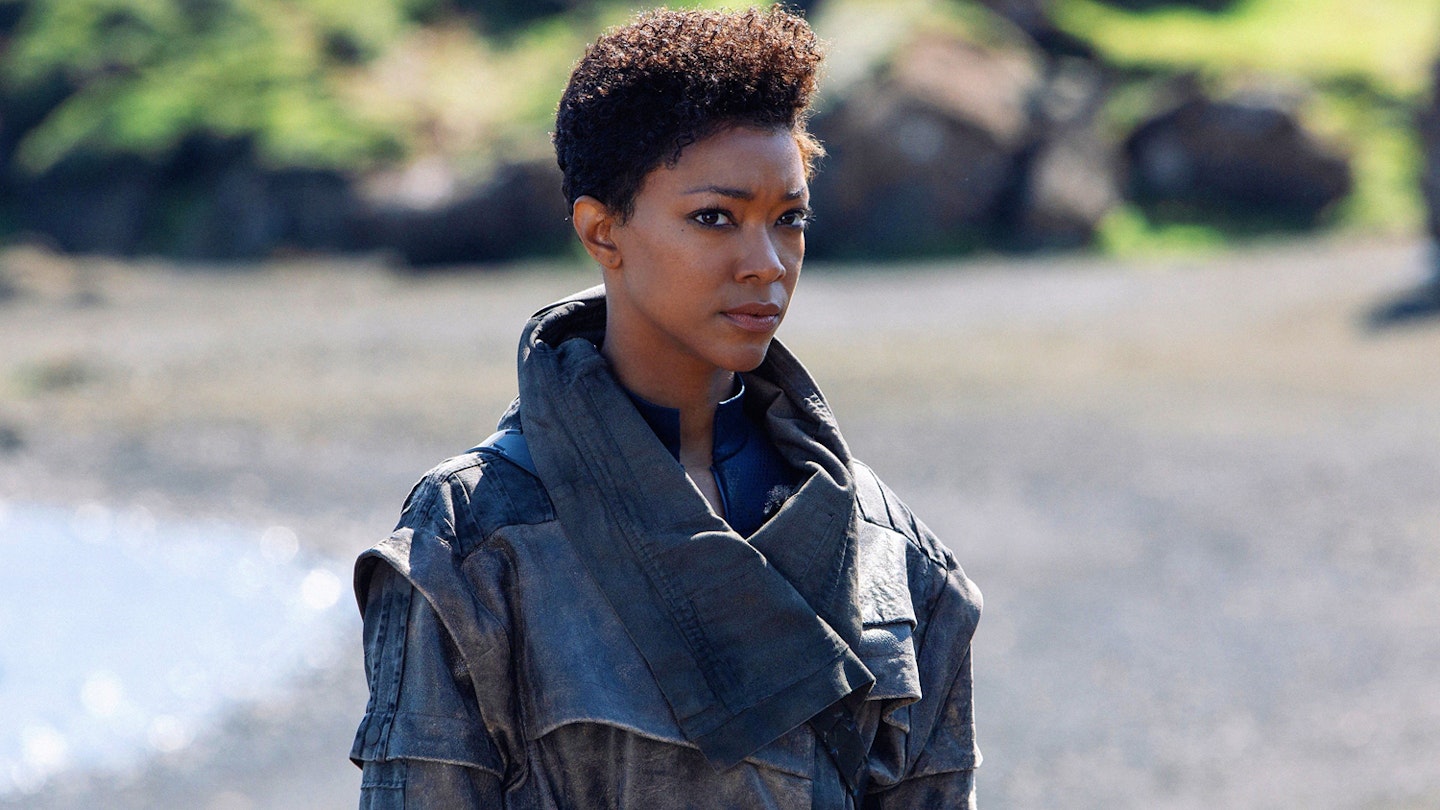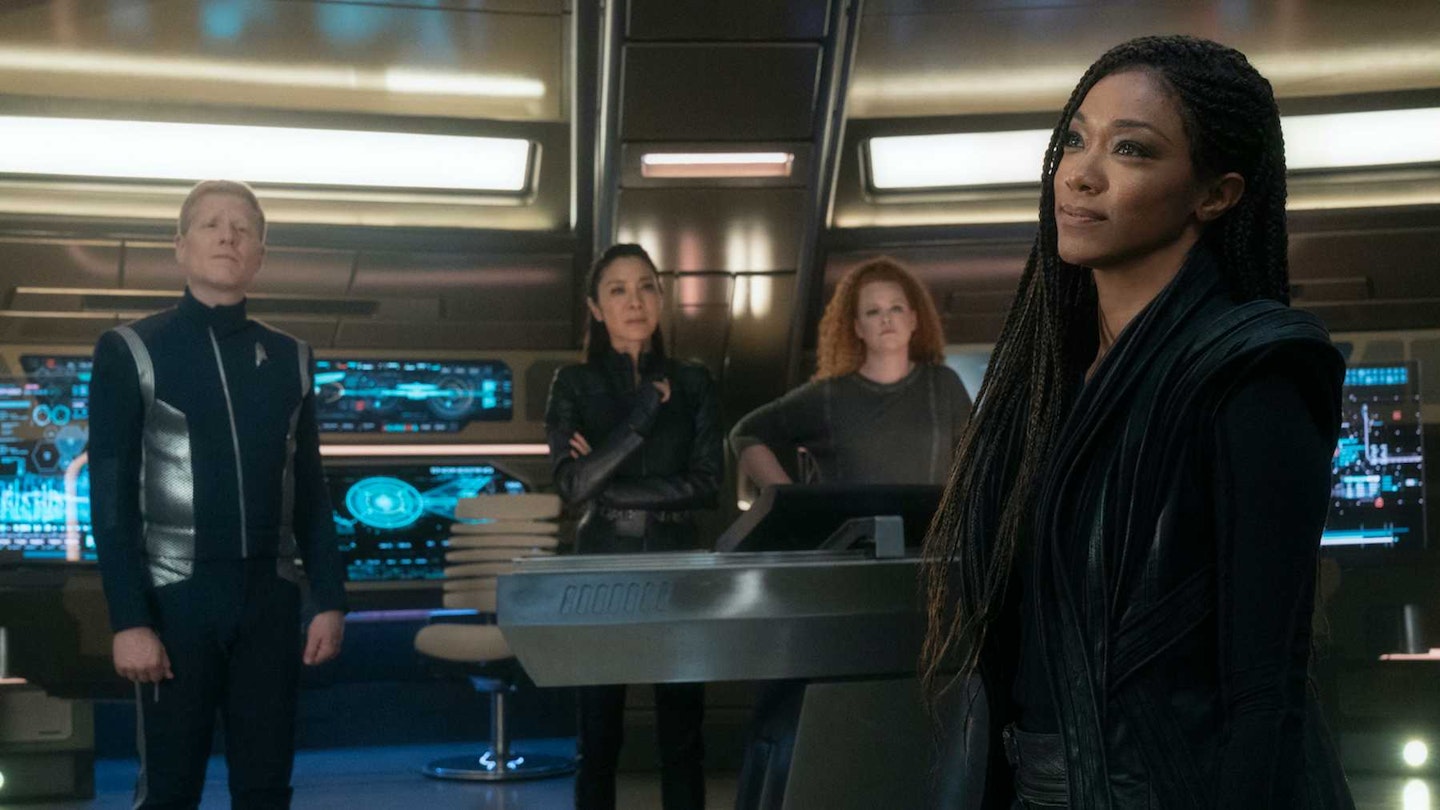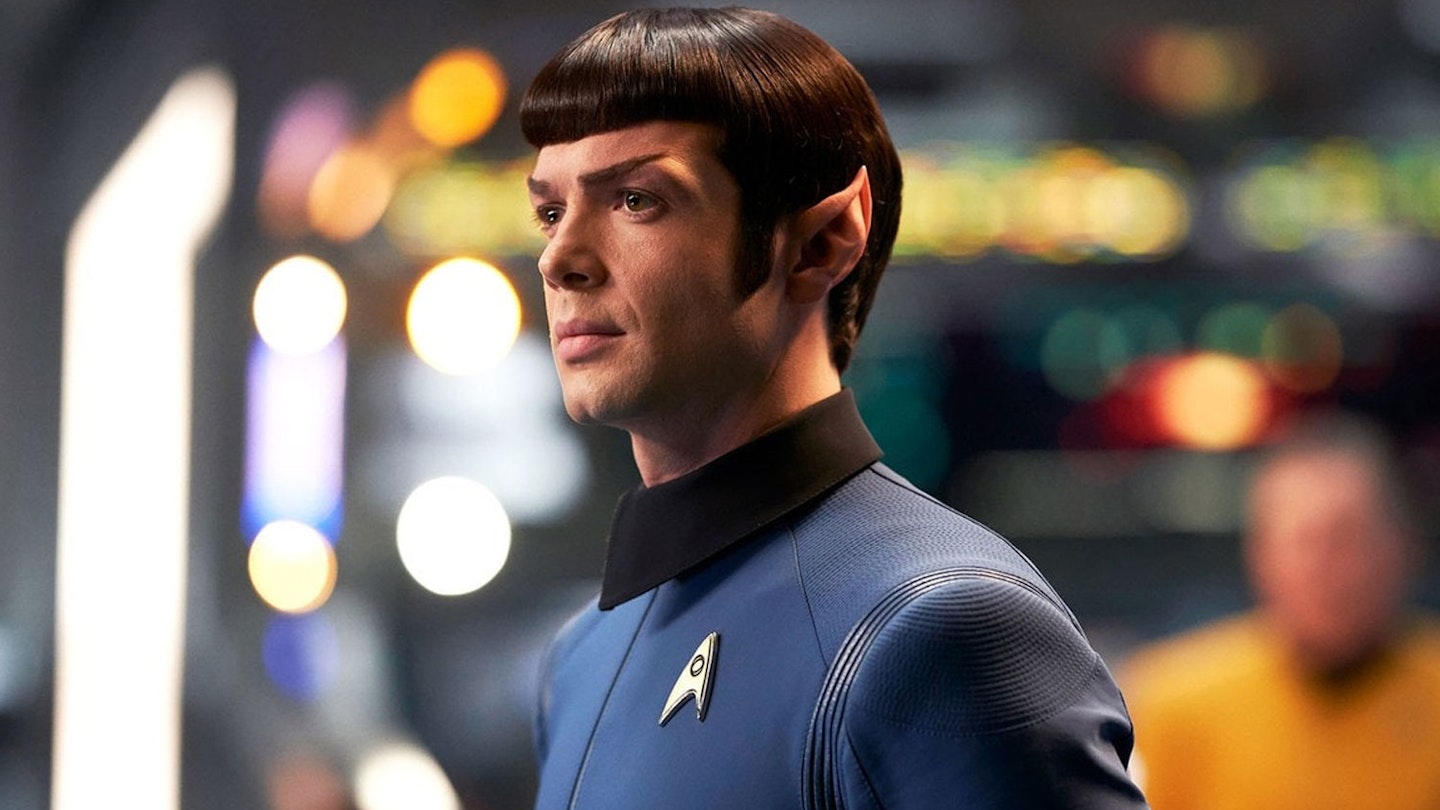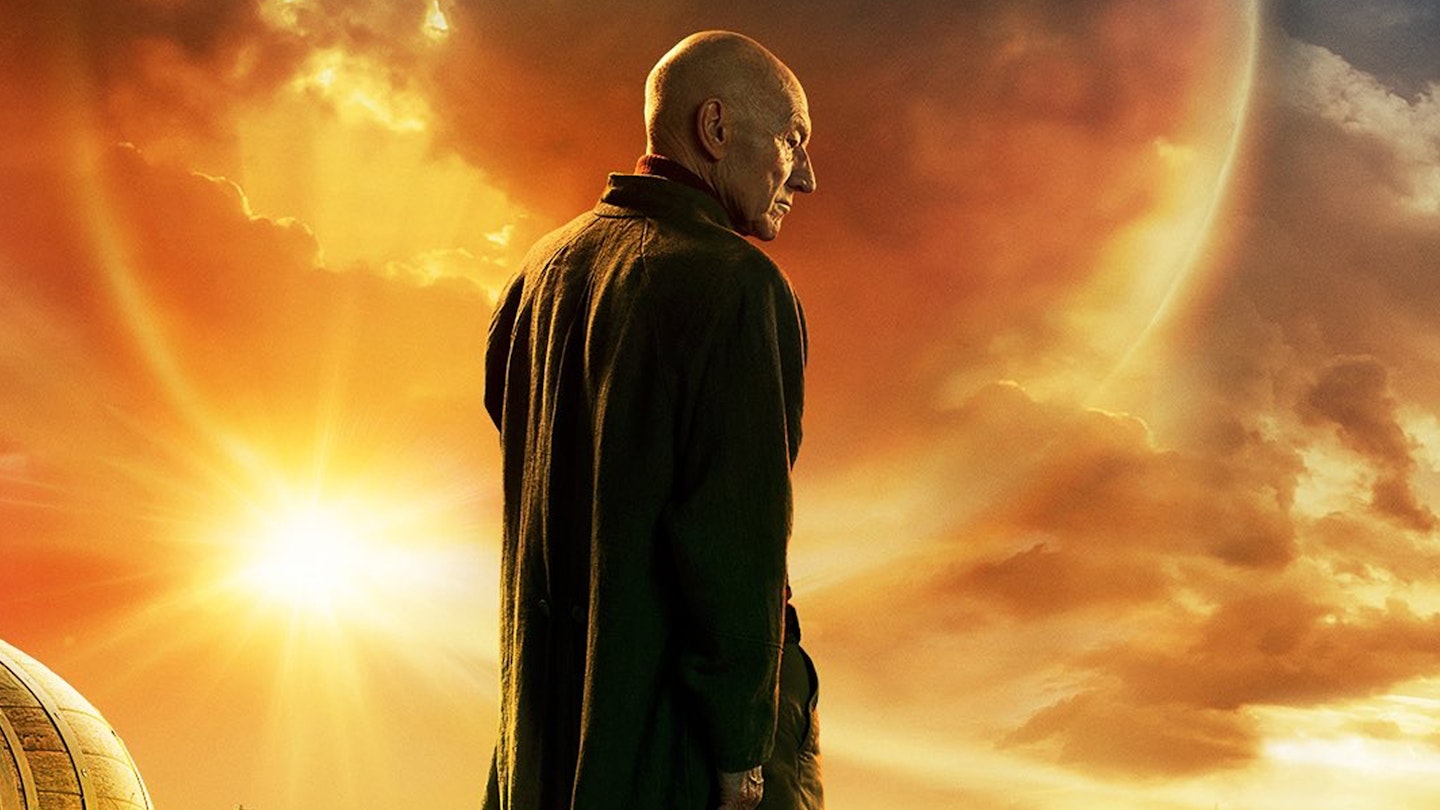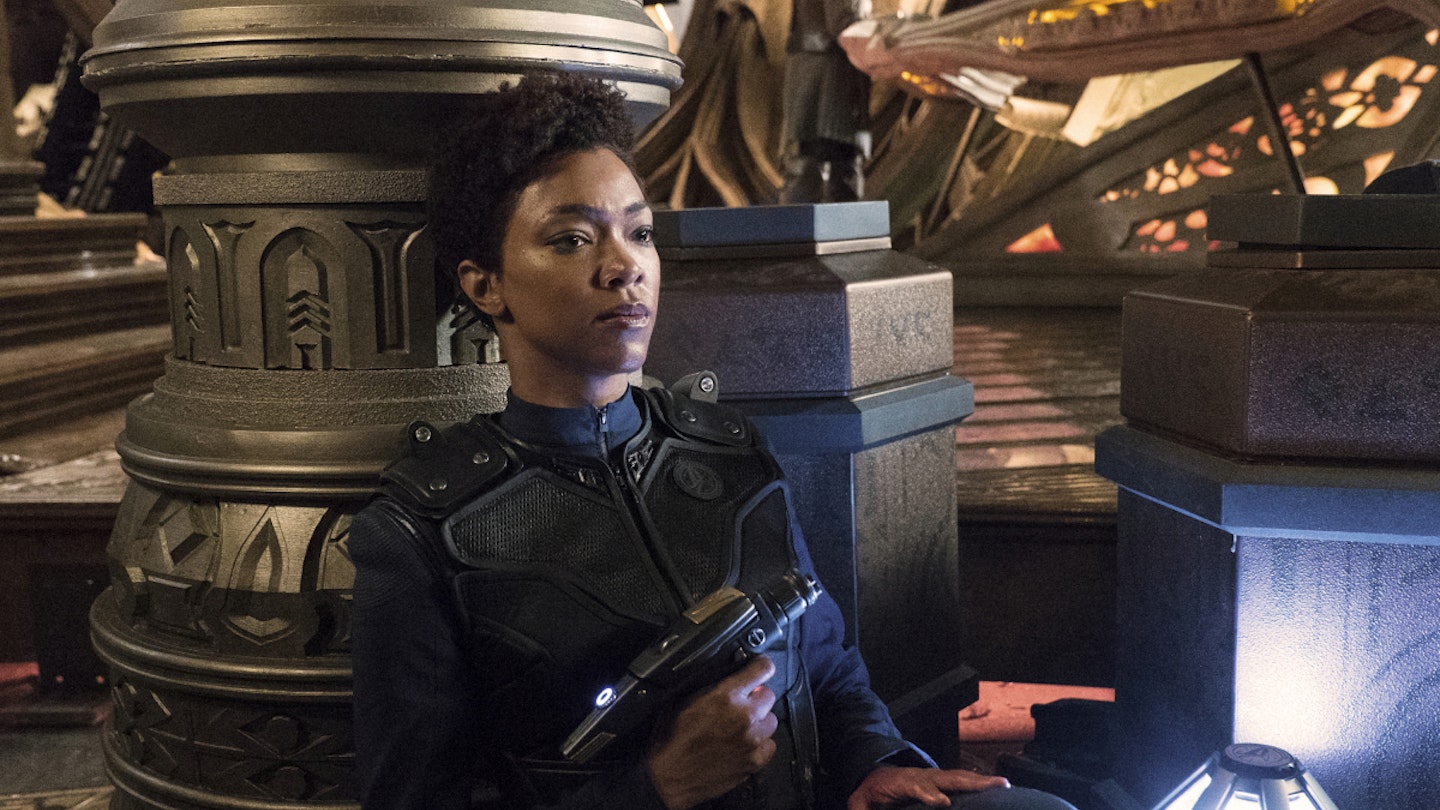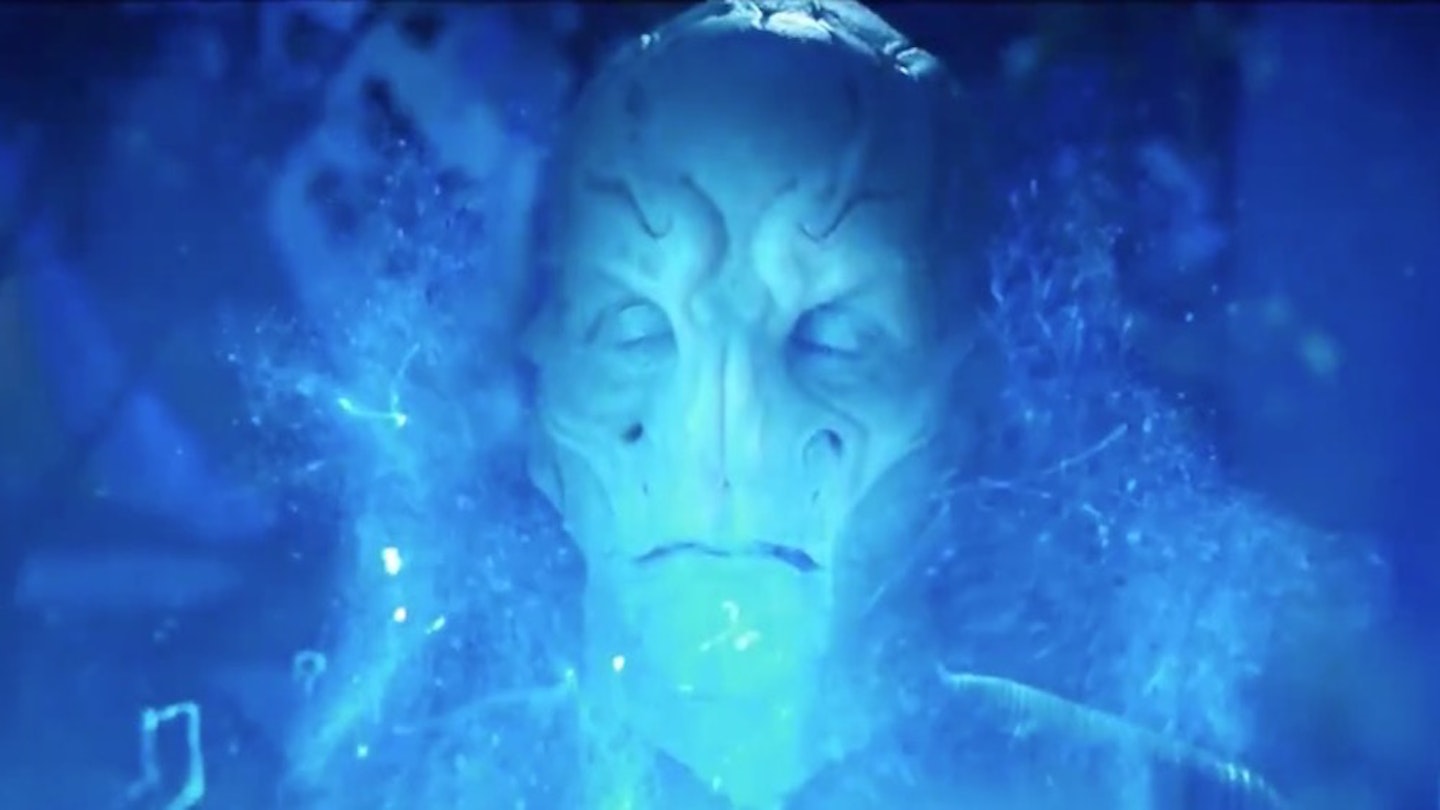Spoilers are coming toward you at warp speed, so you'd better have deflectors on full
Review Episode 1: "The Vulcan Hello"; Review Episode 2: "Battle At The Binary Stars"
Regular Cast: Sonequa Martin-Green (Michael Burnham), Doug Jones (Saru), Shazad Latif (Ash Tyler), Anthony Rapp (Paul Stamets), Mary Wiseman (Sylvia Tilly), Jason Isaacs (Gabriel Lorca); Guest Starring: Rekha Sharma (Ellen Landry); Teleplay by Gretchen J. Berg, Aaron Harbers and Craig Sweeney; Story by Bryan Fuller, Gretchen J. Berg and Aaron Harbers; Directed by Akiva Goldsman
In some ways it’s unfortunate that Discovery is preceded by the name Star Trek, because what’s beginning to become clear with this third episode of the series is that there is an intriguing show here, but it’s just a question of how much it really feels like, or more accurately represents, Trek. Sure, it has the uniforms, the distinctive style of starships and the tech, and we’re certainly fed heaping helpings of what Starfleet is supposed to represent, but so much of that element is overridden by unfolding events and character moments that seem filled with resentment rather than admiration for what is essentially the franchise’s philosophical underpinning.
Things kick off six months after the events of Discovery’s first two episodes, The Vulcan Hello and Battle At The Binary Stars, and open on a prisoner transport shuttle on which Michel Burnham is a passenger. Based on the conversation of fellow prisoners, these are far from the enlightened souls that should be populating this world. We also learn that the war with the Klingons begun in the previous episode has claimed over 8,000 lives, including family members of one of the other prisoners. Before that’s taken any further, however, they find themselves the victims of an alien life form attack that is draining the energy from their ship. At the last possible moment, they are gripped by a tractor beam and brought aboard the starship Discovery, which, it should be said, as inspired by Ralph McQuarrie’s illustrations for the unfilmed 1976 Star Trek film Planet Of The Titans, looks awesome.
Discovery’s Chief of Security Ellen Landry (Battlestar Galactica’s Rekha Sharma) addresses the prisoners as garbage, and comments on Starfleet’s first mutineer (Burnham). As they’re escorted through what is supposed to be a science vessel, they observe how heavily armed crewmembers are, and that their uniforms have black badges. Landry notes that Starfleet says they have to feed the “animals” (again, not feeling the Trek vibe in moments like these) and brings them to the mess hall with other crewmembers.
Two of her fellow prisoners attempt to take out Burnham , but she dispatches them pretty quickly. It’s a contrived moment in that even criminals wouldn’t be so moronic as to attack someone in the middle of a starship mess hall, although it does demonstrate how Burnham handles herself in a fight. It also serves as a set-up for her being brought to the bridge, where she sees Saru. Without a word being exchanged, she is brought to Discovery’s captain, Gabriel Lorca, in his ready room.
Lorca insists that Burnham will help with repairs to the ship, despite her protests against doing so. He leaves her no choice, noting he will do whatever he has to in order to carry out his mission, which is to help win this war against the Klingons. She finds herself sharing quarters with Sylvia Tilly, an awkward cadet who dreams of one day becoming captain.
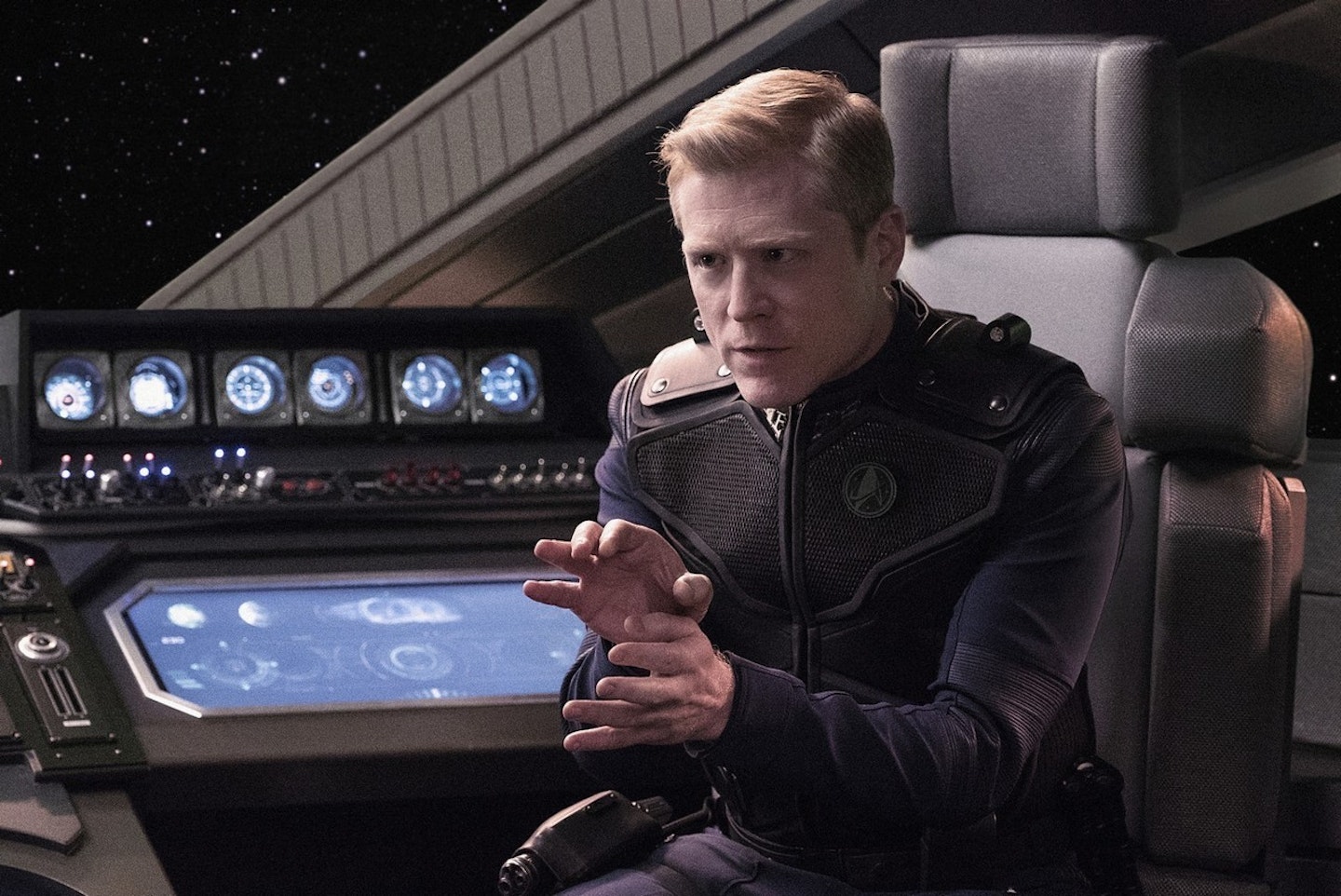
The next day Burnham encounters Saru, who is first officer of Discovery. He escorts her to engineering where she is assigned, and en route there is a scene where she tries to apologize for what happened aboard the Shenzhou. Saru acknowledges that she probably does feel regret, but he also points out that while Captain Lorca goes into dangerous situations without fear, Saru fears Burnham, and he pledges that he will protect his captain in a way that Burnham failed to protect hers. It is a great moment, Martin-Green subdued as Doug Jones delivers Saru’s measured comments, which are accompanied by a sense of strength we didn’t get from him in the first two episodes. It’s obvious that the events of what’s come before, and the war as a whole, has had a profound affect on him. Nicely played.
Burnham finds herself assigned to the team of Science Officer Paul Stamets, with the actor who plays him, Anthony Rapp, effectively projecting a great deal of arrogance in his first moments with her, particularly when he finds out that she may have been raised on Vulcan, but isn’t actually one as he had been told. That, he notes, is like saying his uncle, who’s in a Beatles cover band, is John Lennon (a surprising but welcome pop culture reference — but, hey, why wouldn't The Beatles survive into the 23rd Century?).
As things unfold, there is the sense of a growing mystery as people seem to be operating under personal agendas. This becomes more apparent when word reaches them that a sister ship, the Glenn, has been attacked. Stamets will bring a shuttle team to that ship to investigate, and he’s told to include Burnham. En route (and following some tense moments between Stamets and Lorca), he reveals to Burnham what’s really bothering him: he was part of a team who had discovered that on the quantum level there is no difference between biology and physics; that spores are the building blocks of energy across the universe; and he is experimenting on physics as biology. This was the nature of his studies, but then the war began and Starfleet took over all research, not for diplomacy and exploration, but for warfare. It’s obvious he has genuinely negative feelings towards his captain and Starfleet as a whole because of this.
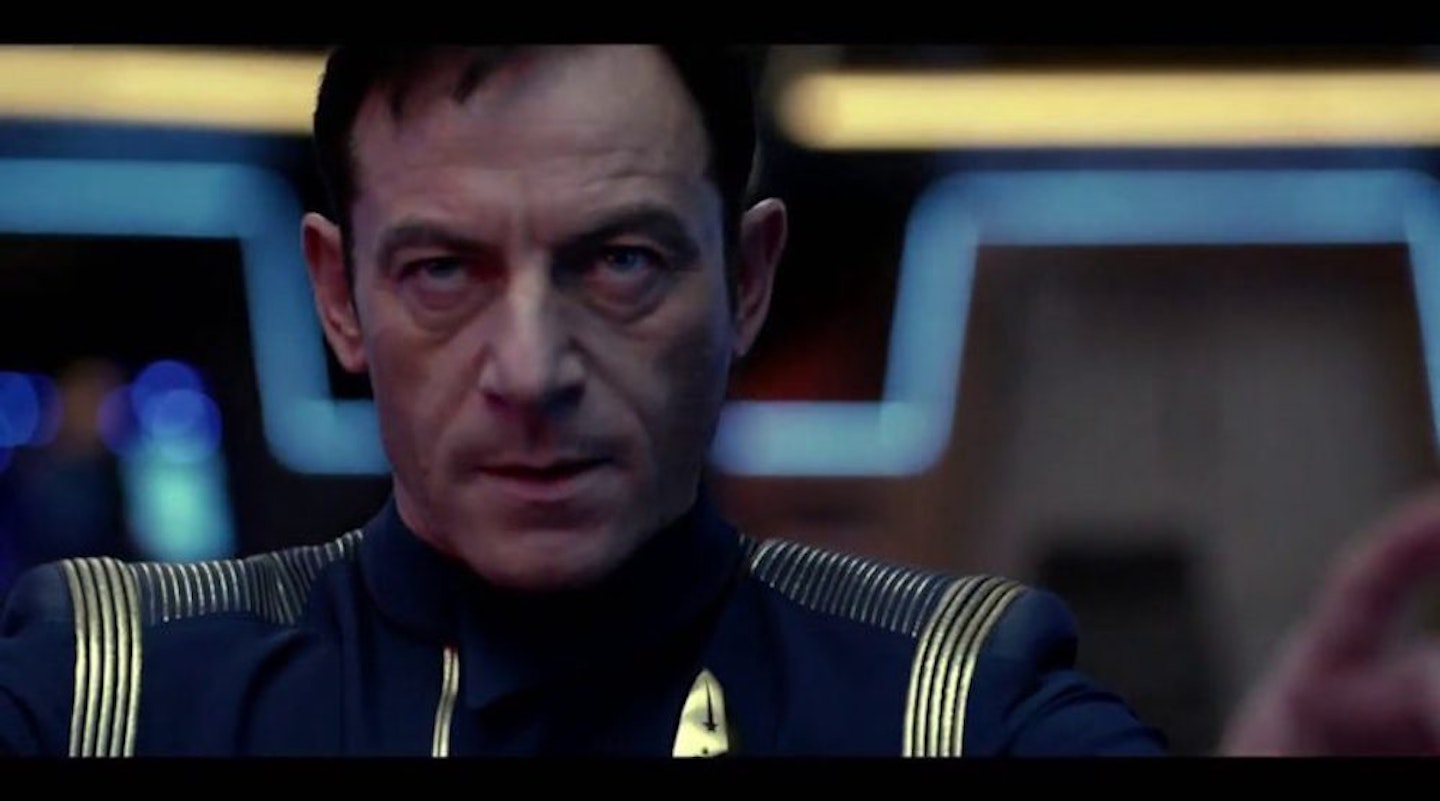
Boarding the Glenn, they find dead, bloodied bodies everywhere. There’s fear the Klingons have already been there and taken “the device.” If so, says Stamets, then it’s “all over” (this is not elaborated any further on at this point). As they continue through mostly darkness (their instruments providing the only illumination), they find the bodies of dead Klingons as well. Then they encounter a large creatures that begins pursuing them as the episode takes on an Alien vibe. They manage to (barely) escape the ship and head back to Discovery. There Burnham is prepared to continue her relocation as a prisoner, but then Lorca invites her to become a member of Discovery’s crew. She initially refuses, but then wants to know why he wants her, believing that he’s been testing her since she arrived.
Her theory is that Lorca is developing a biological weapon that is forbidden by the Geneva Protocols of 1928 and 2155; that he needed someone to help him, and here she comes in the form of a mutineer who had been intent on waging an unsanctioned war against the Klingons. He counters with his belief that she would be desperate to escape her life sentence, but she’s not. At least not until Lorca reveals what he’s really working on: not a weapon to kill, but an organic propulsion system that would allow them to travel galaxies in a mere instant. This, he believes, will allow them to win the war. To prove his point, he has her step into a chamber and takes her on a journey around the galaxy in a matter of moments. He did choose her, but not for the reasons she thinks. Lorca applauds her instincts with the Klingons and believes that the nature of her thinking can only benefit him and the crew in this time of war.
At episode’s end the prison shuttle leaves, but Burnham remains behind. What she doesn't see is that Lorca has beamed over the creature from the Glenn before having that ship destroyed, and imprisoned it on the Discovery. Obviously he hasn’t revealed everything to her.
We should probably say hello to Jason Isaacs here, as he makes his debut as Lorca in this episode, and pretty quickly establishes himself as a captain to be reckoned with. And with his strength (and apparent ruthlessness) comes an enigmatic quality that prevents us from determining just who he is, and on whose side he's really operating.
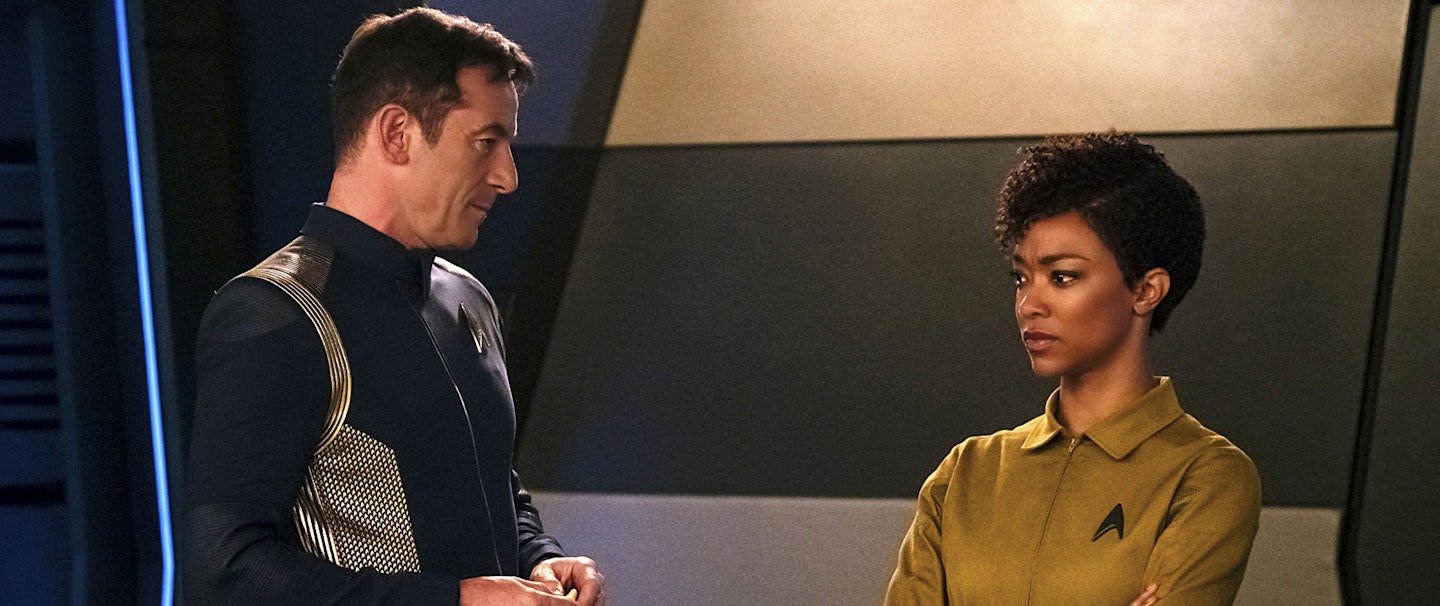
So in summation we’re back to that quandary of the difference between Discovery and Star Trek: Discovery. If the former, there’s a hell of a drama beginning to unfold (despite some missteps in the first two episodes), with an evolving and growing mystery at its core, and characters who seem to be following personal objectives rather than being united by a common goal. But if the latter, there remain some serious issues, most of which stem from the fact that a dramatic situation has been created in the form of the war with the Klingons that is causing people to strip themselves of their Starfleet training, of all that they have achieved as evolved humans, in the pursuit of victory.
On Star Trek: Deep Space Nine, the frequently serialized storyline gradually led to the Dominion War that would come to define the series in its later seasons. With some exceptions (and we were made to realize how significant those exceptions were to the characters), members of Starfleet maintained the tenets of their training and their evolved philosophy. Yes, they fought. Sometimes they killed. But ultimately they were true to their core values. There was no question of why they were fighting, or what was at stake. That's the difference with Discovery.
Theoretically, this show is supposed to reach beyond the fandom and embrace the unwashed. If that’s the case, it needed to establish the ideals of what Star Trek is supposed to represent so that when dramatic events unfold, we see the characters struggle against losing who they are in the pursuit of a military victory. Instead, in the premiere episode, in the form of Burnham, we saw a first officer committing mutiny to save her captain and her ship, but betraying everything she had been a part of in the process. In this episode, Stamets has a deep resentment for his captain, Lorca is revealed to be manipulating Burnham for his own ends and has an agenda of his own, and much of the crew is apparently a part of a growing conspiracy.
What this translates to is that a lot is being lost by these people in the process, but we can’t possibly have a true sense of that loss because who they’re supposed to be hasn’t been properly established. Yet.
Some Questions Regarding Star Trek: Discovery
Is Discovery going to be primarily a plot driven show?
No. It seems that while the show is going to have a plot that continues from episode to episode, at its core are the characters and their evolution will reportedly be at the center of the story that unfolds.
Are characters commiting warcrimes redeemable?
If anybody is, it's Michael Burnham. Whether we agree with it or not, we understand why she committed mutiny on the Shenzhou, and we would imagine, as the true nature of Captain Lorca's plan unfolds, we will see her rise to ultimatley do the right thing to save Starfleet and the Federation.
Are DS9 fans more likely to enjoy Discovery?
Fans of Deep Space Nine will likely feel extremely comfortable in this particular world of serialized and darker storytelling. But based on comments made by the show's producers, they're at least holding out the hope that what they're planning will appeal to fans across the franchise.
What's with the black comm badges?
One popular theory is that they are something utilized by Secton 31, Starfleet's covert agency, indicating that Discovery,despite being designated as a research vessel, is actually on a covert mission. Given the behavior of so many, that isn't unlikely.
